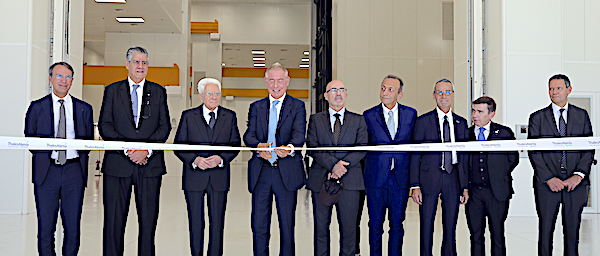
Thales Alenia Space, a joint venture between Thales (67%) and Leonardo (33%), has today inaugurated its Space Smart Factory in Rome with a ceremony attended by Italian President Sergio Mattarella. The factory — one of Europe’s largest intelligent, digital, reconfigurable manufacturing facilities — is located at the Tecnopolo Tiburtino high-tech innovation hub in Rome.
President of the Italian Republic, Sergio Mattarella, and Minister for Enterprises and Made in Italy, Adolfo Urso, were welcomed by Ambassador Stefano Pontecorvo, Chairman of Leonardo; Roberto Cingolani, CEO and General Manager of Leonardo, and Teodoro Valente, President of the Italian Space Agency (ASI). The delegation also included Philippe Keryer, SEVP Strategy, Research and Technology for Thales, Massimo Claudio Comparini, Managing Director of Leonardo’s Space Division and Chairman of the Thales Alenia Space Supervisory Board, Hervé Derrey, President and CEO of Thales Alenia Space, and Giampiero Di Paolo, Deputy CEO of Thales Alenia Space and CEO of Thales Alenia Space Italia.

From left to right: Hervé Derrey, President and CEO of Thales Alenia Space, Ambassador Stefano Pontecorvo, Chairman of Leonardo, Sergio Mattarella, President of the Italian Republic, Adolfo Urso, Minister for Enterprises and Made in Italy, Roberto Cingolani, CEO and General Manager of Leonardo, Giampiero Di Paolo, Deputy CEO of Thales Alenia Space and CEO of Thales Alenia Space Italia, Teodoro Valente, President of the Italian Space Agency (ASI), Massimo Claudio Comparini, Managing Director of Leonardo’s Space Division and Chairman of the Thales Alenia Space Supervisory Board, and Philippe Keryer, SEVP Strategy, Research and Technology for Thales.
The concrete Space Smart Factory is the result of an investment of over €100 million, partly financed through PNRR funds managed by the Italian Space Agency and by substantial investments from Thales and Leonardo.
The new production hub, scheduled to begin operations by year’s end with work on the Sicral 3 satellite for the Italian Defense Ministry, is based at Rome’s Tecnopolo Tiburtino — a “center of technological excellence” bringing together 150 companies, mostly SMEs, closely integrated with the city and its industrial landscape.
“Today, Italy soars even higher. With the inauguration of this new Space Smart Factory, we are taking another strategic step to strengthen the national space supply chain and consolidate Italy’s leadership by enhancing our capacity to design and integrate next-generation satellites,” said Adolfo Urso, Minister for Enterprises and Made in Italy. “This project also stands as a concrete example of effective collaboration between the public and private sectors and of the virtuous use of PNRR funds. Italy knows how to invest with strategic vision in key sectors, generating growth and qualified employment. We are at the forefront of strengthening our technological sovereignty and projecting our industrial system into the future,” said Adolfo Urso, Minister for Enterprises and Made in Italy.
“The inauguration of this state-of-the-art facility crowns years of intense efforts by Italian Space Agency and completes the network of facilities operating throughout the country for the assembly, integration and testing of satellite” said Teodoro Valente, President of the Italian Space Agency. “The Space Factory program also represents a virtuous example of public-private collaboration for the benefit of the entire national ecosystem, having effectively used the resources of the PNRR to permanently endow the country with a strategic asset. Thanks to the functionality and production capacity of this plant, Italy stands as a reference point for the realization of large satellite infrastructures in the field of Earth Observation, Telecommunications and Navigation.”
“I’m especially proud to inaugurate this new state-of-the-art facility, designed to rank among the world’s most advanced for space system production,” said Hervé Derrey, President and CEO of Thales Alenia Space. “Leveraging the latest technologies, the Space Smart Factory will enhance Thales Alenia Space’s production capacity and its global competitiveness as a leading player in Europe’s space industry. In that sense, our company will even more support European and national sovereign programs as well as the continent’s major space ambitions, including in large constellations.”
“The new space factory, an investment that looks to the future and is the result of the vision of the Italian Space Agency, institutions and the company, is a benchmark for production paradigms of the European space industry,” declared Massimo Claudio Comparini, Managing Director of Leonardo’s Space Division and Chairman of the Thales Alenia Space Supervisory Board. “It is a smart factory that can be reconfigured to produce all types of satellites and constellations using the principle of serialization of activities. The site is capable of producing over 100 satellites a year in the class up to 300 kilograms in an environment integrated with the most advanced digital, robotic and interconnection technologies with the ecosystem of suppliers and partners, a fundamental asset for the growth of the space economy. This is a further stimulus for the growth of space activities in Italy and Europe.”
“Today, with deep pride and in the presence of Italy’s highest institutional authority, we inaugurated our Space Smart Factory — a modern and fully digital facility and a true technological jewel,” said Giampiero Di Paolo, Deputy CEO and CEO of Thales Alenia Space Italia. “At our Satellite Integration Center in Rome — operating at full capacity — our teams have been building some of the world’s most prestigious Earth observation, telecommunications and navigation satellites, establishing the facility as a global benchmark in satellite manufacturing. Building on this legacy, the new Space Smart Factory will serve as an additional production hub able to meet the growing demand for future constellations, while reducing time-to-market and marking a real paradigm shift in space asset manufacturing. This new infrastructure will also be open to the entire supply chain, including small and medium-sized enterprises, which will be able to access it as a service — a winning formula that will strengthen our country’s role in the space economy.”
